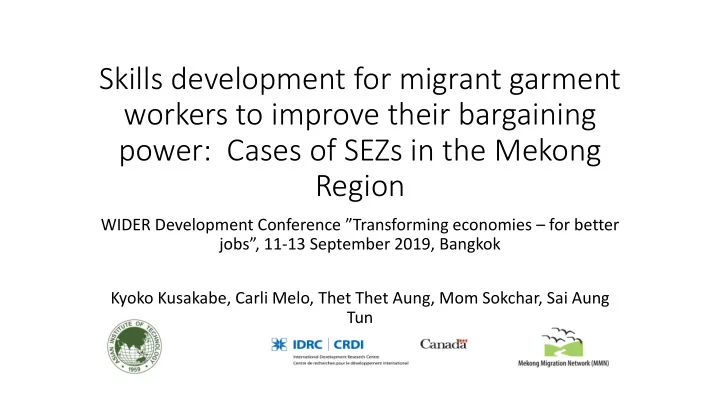

Skills development for migrant garment workers to improve their bargaining power: Cases of SEZs in the Mekong Region WIDER Development Conference ”Transforming economies – for better jobs”, 11 -13 September 2019, Bangkok Kyoko Kusakabe, Carli Melo, Thet Thet Aung, Mom Sokchar, Sai Aung Tun
Textile and clothing export 8 7 6 5 billion USD Myanmar 4 Cambodia Thailand 3 2 1 0 2012 2013 2014 2015 2016 2017
Migrant garment factory workers • “Unskilled” or “low skilled” workers. • Skills development not considered important. • Government’s intention to diversify industry from garment industry (Cambodia/ Myanmar) • Labor shortages
Table 1: Percentage of respondents who received training by sex of respondents Phnom Penh Manhattan Yangon Mae Sot Men 22 (95.7%) 4 (100%) 3 (12%) 11 (37.9%) Women 154 (87.0%) 92 (95.8%) 17 (9.7%) 50 (29.3%)
“Skills do not get reflected in pay and I am only paid only at a piece rate. If there is a piece rate, there is no promotion. There is no promotion in the factory. Some worked for 20 years, and were receiving 250 baht. But now their pay is 180 baht per day” (Interview, November 2018).
Earnings and experiences in garment work among respondents Phnom Penh Manhattan Yangon Mae Sot Average year of 2011 2012 2013 2010 starting to work in garment factories Average wage 196.4 USD/ month 205.5 USD/ month 119.0 USD/ month 164.5 USD/ month during off season Average wage 247.5 USD/ month 247.7 USD / 142.4 USD/ month 211.1 USD / during high month month season Correlation No significant Significant Significant Significant between number correlations correlations during correlations for correlations only of years in busy season wages both busy season for busy season garment and wage and off season wages
• We can start business in village [if we stop working in factories], but all businesses are already started by others. There are several grocery shops in the village already (Interview, Manhattan SEZ, 24 February 2019).
Barriers to skills development • No requirement for skills when applying for job • Managers not keen to invest in skills development • Priorities of workers
Opportunities for skills development • There are many workers in one factory • Skills training as compulsory • Employers recognize the importance
Recommendations • Standardization of skills and certification for skills linked to wage level • Skills competency standards should include soft skills as well • Make training during working hours compulsory in all garment factories
Thank you http://dds.ait.ac.th/jobs-at-the-border/
Recommend
More recommend